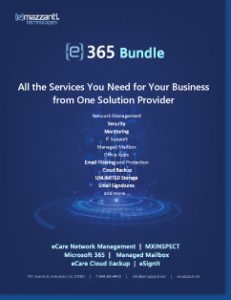As a kid, I used to make a tin can telephone by tying a string to each of two soup cans. When two tin cans are connected, you can send and receive sound waves. Imagine, for a moment, that this tin can string spans the width of your office. Two of your employees need to communicate through the tin cans, so they build the connection. A third employee is invited to “join the call”, so he ties his tin can to the string of the first two cans. Then a fourth employee ties his string, then a fifth, and so on. This concept is the very foundation on which the Internet works: sending and receiving information over a wire (in the tin can example, sound waves).
The Internet is essentially one giant connection through copper, fiber optics, and telephone lines, separated by networking devices. These networking devices may be routers, modems, or switches, among others. The difference between the Internet and the tin can example is that there is not one main wire that everyone connects to – instead, using the metaphor, the first employee may have a direct connection to the fourth, and the second employee may have a direct connection to the third. Imagine two companies connecting together, and you can see where things get tricky. The connections become entangled and form a web, thus bringing light to the term “World Wide Web”.
Now, in the real world, companies are generally connected to each other through a switch, then a router, a firewall, a modem, and then to the company’s Internet provider. The company’s internet provider then connects to a server at a datacenter or another computer through a web of Internet providers hooking-in to each other’s connection.
So where does the cloud fall into all of this?
The cloud is simply a metaphor for a bunch of datacenters and Internet providers connected together. That’s it. A datacenter is like a warehouse, but instead of inventory, it contains hundreds or even thousands of servers (a high powered computer). When you send an email, your computer talks to your mail server and asks it to deliver a message. Your mail server figures out the best path to take to the recipient’s mail server, makes the connection, and delivers the message. If both of your mail servers are in datacenters, then you just experienced the cloud in action. If you go to datacentermap.com, you can actually see most of the datacenters in the world.
How can you benefit from the cloud?
Say you want your email, documents, and other company data available to your all of your employees. Traditionally you go through the process of purchasing a server, paying a company to prepare and install the server, move the data, and make sure everything is working, right? Moving to the cloud means that instead of purchasing your own server, you rent these services from another company. So, how is this beneficial?
Benefits of the cloud:
- Work from anywhere – the connection exists between you and the server in the cloud; no VPN connection required
- Free cloud server maintenance – servers are monitored & maintained by technicians daily
- Free cloud server backups – backups are performed several times a day, and in some cases, every 15 minutes
- Availability – if a physical server fails, it automatically fixes itself by starting up on another physical server
- Top-notch security – firewalls are constantly monitored; technicians are alerted if there is an attempted intrusion
- Scalability – as your business grows, so can the server, without any additional hardware purchases
Examples of cloud services:
- Gmail, Hotmail, Yahoo Mail, etc. – personal & some business email services
- eMazzanti’s Cloud Computing













